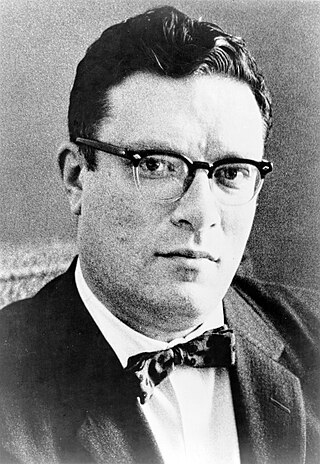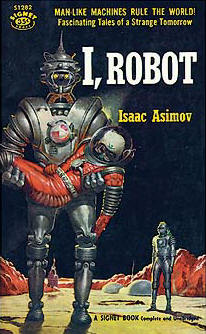
Isaac Asimov was an American writer and professor of biochemistry at Boston University. During his lifetime, Asimov was considered one of the "Big Three" science fiction writers, along with Robert A. Heinlein and Arthur C. Clarke. A prolific writer, he wrote or edited more than 500 books. He also wrote an estimated 90,000 letters and postcards. Best known for his hard science fiction, Asimov also wrote mysteries and fantasy, as well as popular science and other non-fiction.

The Three Laws of Robotics are a set of rules devised by science fiction author Isaac Asimov, which were to be followed by robots in several of his stories. The rules were introduced in his 1942 short story "Runaround", although similar restrictions had been implied in earlier stories.

Janet Opal Asimov, usually writing as J. O. Jeppson, was an American science fiction writer, psychiatrist, and psychoanalyst.

Elijah "Lije" Baley is a fictional character in Isaac Asimov's Robot series. He is the main character of the novels The Caves of Steel, The Naked Sun and The Robots of Dawn, and of the short story "Mirror Image." He is seen in flashbacks several times and talked about frequently in Robots and Empire, which is set roughly 160 years after his death. He is further mentioned in passing in "Foundation and Earth" as a "Culture Hero". Besides Asimov's works he appears in the Foundation's Friends story "Strip-Runner" by Pamela Sargent, and "Isaac Asimov's 'The Caves of Steel'" poem by Randall Garrett.
The Black Widowers is a fictional men-only dining club created by Isaac Asimov for a series of sixty-six mystery stories that he started writing in 1971. Most of the stories were first published in Ellery Queen's Mystery Magazine, though a few first appeared in Fantasy & Science Fiction, Isaac Asimov's Science Fiction Magazine, and the various book collections into which the stories were eventually gathered.

Fantastic Voyage is a 1966 American science fiction adventure film directed by Richard Fleischer and written by Harry Kleiner, based on a story by Otto Klement and Jerome Bixby. The film is about a submarine crew who is shrunk to microscopic size and venture into the body of an injured scientist to repair damage to his brain. In adapting the story for his script, Kleiner abandoned all but the concept of miniaturization and added a Cold War element. The film starred Stephen Boyd, Raquel Welch, Edmond O'Brien, Donald Pleasence, and Arthur Kennedy.

Lucky Starr is the hero of a series of science fiction books by Isaac Asimov, using the pen name "Paul French" and intended for children.

Murder at the ABA (1976) is a mystery novel by American writer Isaac Asimov, following the adventures of a writer and amateur detective named Darius Just, whom Asimov modeled on his friend Harlan Ellison. While attending a convention of the American Booksellers Association, Just discovers the dead body of a friend and protégé. Convinced that the death was due to murder, but unable to convince the police, Just decides to investigate on his own.
The Trap Door Spiders are a literary, male-only eating, drinking, and arguing society in New York City, with a membership historically composed of notable science fiction personalities. The name is a reference to the reclusive habits of the trapdoor spider, which when it enters its burrow pulls the hatch shut behind it.

Before the Golden Age: A Science Fiction Anthology of the 1930s is an anthology of 25 science fiction stories from 1930s pulp magazines, edited by American science fiction writer Isaac Asimov. It also includes "Big Game", a short story written by Asimov in 1941 and never sold. The anthology was first published in April 1974, and won the 1975 Locus Award for Best reprint anthology.
"Unto the Fourth Generation" is a fantasy short story by Isaac Asimov. It first appeared in the April 1959 issue of The Magazine of Fantasy and Science Fiction (F&SF) and has been reprinted in the collections Nightfall and Other Stories (1969) and The Best Science Fiction of Isaac Asimov (1986). It is Asimov's most explicitly Jewish story.
The Intelligent Man's Guide to Science is a general guide to the sciences by the American writer and scientist Isaac Asimov. It was first published in 1960 by Basic Books. Revised versions were published as The New Intelligent Man's Guide to Science (1965), Asimov's Guide to Science (1972), and Asimov's New Guide to Science (1984).
"Exile to Hell" is a science fiction short story by American writer Isaac Asimov. It appeared in the May 1968 issue of Analog Science Fiction and Fact and was included in the 1975 collection Buy Jupiter and Other Stories.
"The Greatest Asset" is a science fiction short story by American writer Isaac Asimov. It was written as a counterpoint to his story "2430 A.D." with the intention of refuting, rather than illustrating, the same quotation by writer and social commentator J. B. Priestley. It was published in the January 1972 issue of Analog and reprinted in the 1975 collection Buy Jupiter and Other Stories.
Big Game is a short story by the American science fiction writer Isaac Asimov. He wrote it in November 1941 when he was 21, failed to sell it to any magazine, and eventually lost the manuscript. In 1972 when Asimov compiled a collection of his earliest stories, The Early Asimov, he listed "Big Game" as the last of eleven stories which he had failed to publish anywhere and which he thought were lost forever. However a fan of his, Matthew B. Tepper, discovered the missing manuscript in a collection of Asimov's old papers which were archived in the library of Boston University and sent it to him. Asimov included it in an anthology he was editing at the time, Before the Golden Age (1974), although he pointed out that he had re-used the plot of the rejected story to write "Day of the Hunters" in 1950.
"The Ultimate Crime" is a short story by Isaac Asimov, dealing with a minor aspect of one of the Sherlock Holmes stories of Sir Arthur Conan Doyle. It is the 24th of Asimov's Black Widowers mystery stories, and it appeared in his anthology More Tales of the Black Widowers, which collects the second dozen stories of the series. It was written specially for that book. It subsequently appeared again in Sherlock Holmes Through Time and Space, an anthology of stories written by different authors and co-edited by Asimov, and Another Round at the Spaceport Bar.
In a writing career spanning 53 years (1939–1992), science fiction and popular science author Isaac Asimov (1920–1992) wrote and published 40 novels, 383 short stories, over 280 non-fiction books, and edited about 147 others.
Isaac Asimov wrote three volumes of autobiography. In Memory Yet Green (1979) and In Joy Still Felt (1980) were a two-volume work, covering his life up to 1978. The third volume, I. Asimov: A Memoir (1994), published after his death, was not a sequel but a new work which covered his whole life. This third book won a Hugo Award.
Depending on the counting convention used, and including all titles, charts, and edited collections, there may be currently over 500 books in Isaac Asimov's bibliography—as well as his individual short stories, individual essays, and criticism. For his 100th, 200th, and 300th books, Asimov published Opus 100 (1969), Opus 200 (1979), and Opus 300 (1984), celebrating his writing.
Thomas O’Conor Sloane III was an American editor, professor, etymologist and career military officer.








